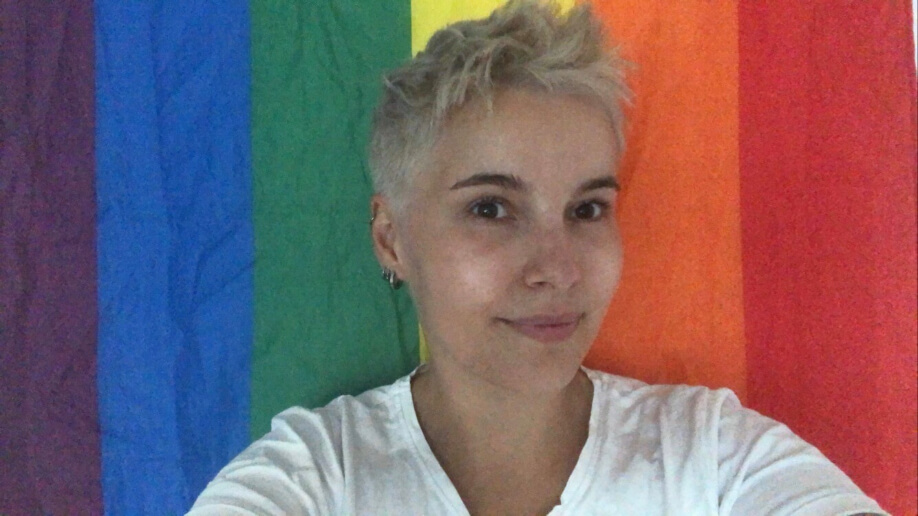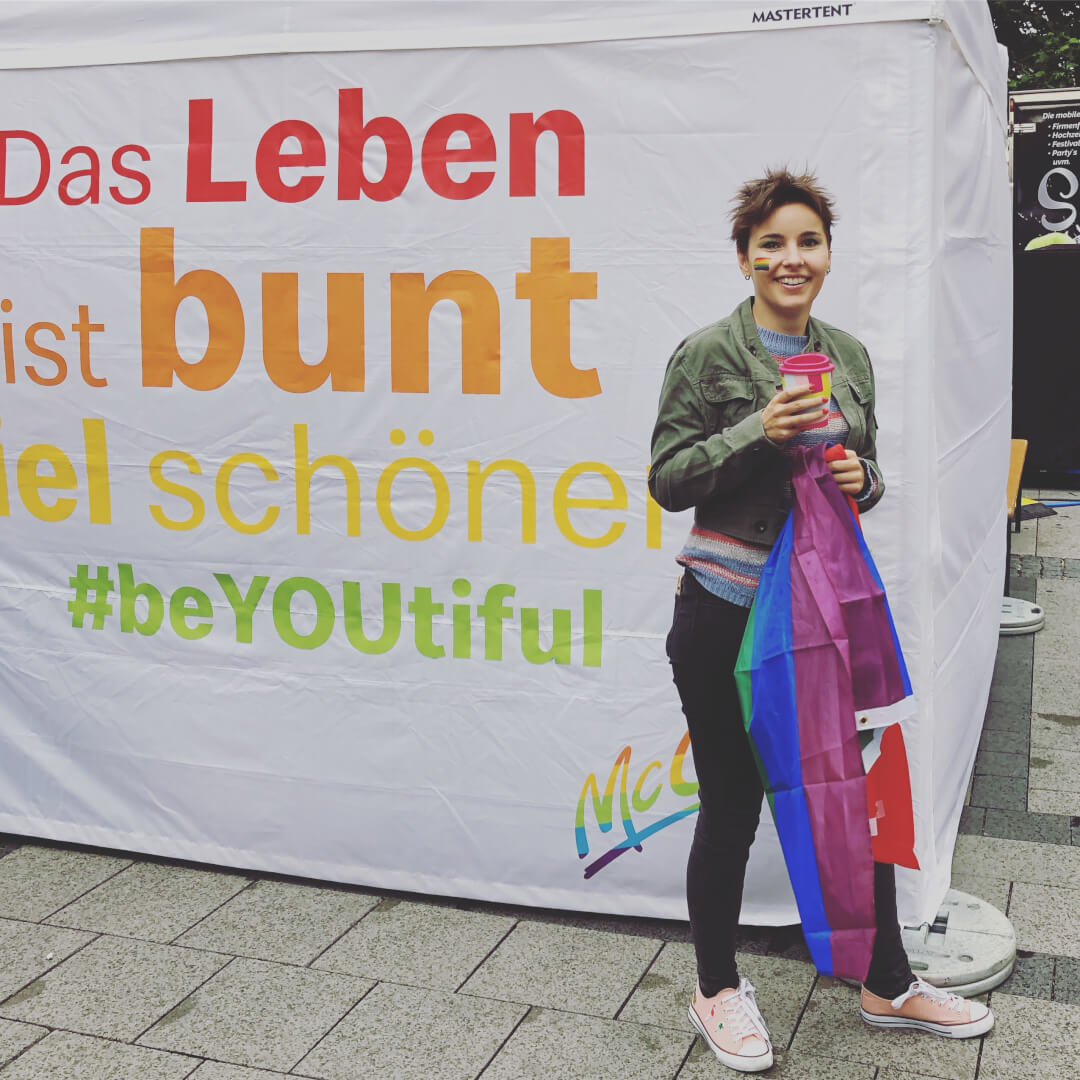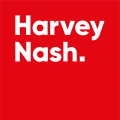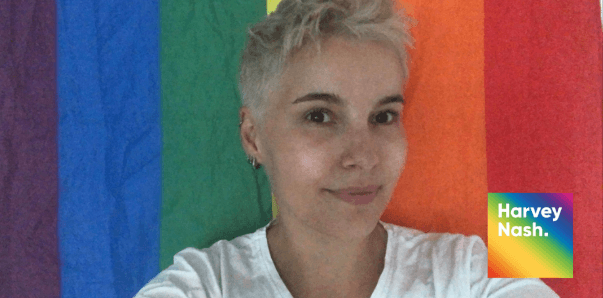Pride Month Celebration Interview with Marta Matejczyk
To celebrate Pride Month, Harvey Nash shone the spotlight on some of our LGBTQIA+ employees, Marta Matejczyk from our Harvey Nash Germany office sat down with David Savage to discuss her coming out as bisexual, the effect it had on her relationship with her family, and how businesses can support the whole LGBTQIA+ community.
David: Marta, tell us a little bit about who you are, how old are. That feels intrusive already. But where you're from and what you do for the business.
Marta: So first of all, this is an interview about my sexuality and my sexual orientation, so I don't think a question about my age is extremely intrusive.
David: People might still feel that it's intrusive!
Marta: Well, I'm 27 and I am from Poland, originally I come from Poland. I live in Germany now for over three years. So it is quite interesting also for me to see how extremely different these two cultures react to and handle LGBTQ people. And I'm sure that's not a surprise for you, but it's much better here in Germany. I am a salesperson. So I work with different accounts with different clients and I make sure they get the best people that they can from us.
David: When did you first realize that you're bisexual? I'm assuming it's something that you've probably always known, but perhaps you were confused for a while or-
Marta: No, that is something that a lot of bisexual people I'm sure will tell you this, that sometimes I feel like I still don't know because there were these moments in my life where I thought I was definitely a lesbian or when I thought I was straight and it's all very chaotic.
For a couple of years I dated girls, I dated boys and I was like, "I'm not going to use any labels for myself. And only around I think, when I was 20, 21, I was like, "I'm clearly bisexual". So I've identified as bisexual for around seven, eight years, and, I'm not going lie to you, there were like short moments in there when I was like, "Maybe I am a lesbian. Like, I haven't been attracted to any men for the last two months, or maybe I am straight and it's all been a huge lie or something."
David: We're in Pride Month for the minute. How do you celebrate pride and what does it mean to you?
Marta: So the whole concept of pride, what it means to me, it has changed so drastically in the last couple of years because in Poland we don't have pride parades, we have something that's called an equality parade, which I think it just shows beautifully that we're not even at that stage yet where we say, "We're proud, we're loud." "We're here, we're queer." We're still at that, "Please, we're your equals, give us some rights." Kind of in that moment in history. My first equality parade, it was 2009, I think, 2010. And it was quite scary. It was a little bit traumatic as well because we were only a couple of 100 people and there were hate groups shouting, calling us perverts and all that stuff. But I continued going every year and I could see the numbers grow every single year.

Pride is extremely important to me, especially for many bisexuals, I think, but also myself. Sometimes you don't feel like you're queer enough, you feel like you don't deserve to be the part of the community because I am dating a man at the moment and sometimes I do have these thoughts, this imposter syndrome, this little voice in my head telling me, "You're not really a queer person. You're just impersonating, you're just pretending, and you don't deserve to be here." And it's incredible to be able to feel like a part of a community and to be able to feel like this is my month, this is my time.
David: One of the most difficult challenges for any LGBTQIA+ youth is the question of family acceptance. So what's your coming out story?
we never really talked about sexuality and stuff like that. I came out to my sisters in the easiest way possible. I just told them when I got my first girlfriend, I was telling them about this girl I date and they didn't ask me any questions. They were just like, "Oh, that's cool. What's her name? What's she like?" They didn't know at the time if I was bi or if I was a lesbian, and I didn't put it into words as well, because I didn't know at the time either. So I was just very open with them because they're my friends as well.
Then when it comes to my mom, my coming out story is a little bit silly because around eight years ago, we were playing a Facebook quiz, where you answer questions about your friend and then the friend answers the same question. And if you both answered the same way and the screen turns green and yay, you´re real friends.
My mom got a question. What is your friend's sexual orientation? And I clicked on bisexual without thinking, and my mom clicked on straight, obviously because she thought I was straight. Immediately, the screen turns red and it's like, "No, wrong. She's actually bisexual.
And we've never talked about this. This topic has never come up afterwards. But ever since then, my mom always puts up a rainbow flag out the window during pride month and I can see her sharing on Facebook, all these interesting articles about the LGBTQ community. Also, she follows me on Instagram now, so she sees all the crazy stuff I post about my sexuality. I know she knows, and I know she supports as well.

David: What's your view of employee pronouns in your email signature?
Marta: Well, to be very honest with you, I'm very confused that this is still a topic because it's such an easy way to make sure you don't misgender people and they don't misgender you. And I put my pronouns everywhere, every portal I use, anything because it's just... You don't have to be trans, you don't have to be non-binary to not like being mis-gendered.But especially if you want to create a safe space for transsexual or
non-binary clients, candidates, or people who work with us, or even friends or
friends of friends, anyone who can see our profile in any of these social media
platforms or our email.
David: Giving clarity on their pronouns on signatures is one small step that people can take to promote a positive and healthy environment. What are other strategies that organizations can follow to promote that healthy environment for colleagues who are part of the LGBTQIA+ community?
Marta: Well, there's something that I keep talking about on LinkedIn and to all my coworkers and to my poor friends who have to listen to me. We have to make sure, if we're a company that really wants the space to be safe for all minorities, for LGBTQ people, we have to make sure to educate our employees and to make sure everyone knows, even during the onboarding process, what not to say or what not to do, to eliminate those microaggressions from the workplace.
Because there are so many things that people do unknowingly and it's not because they hate LGBTQ people. It's not because they are bad people. They're unaware because they were not educated. I truly believe that educating people is kind of like a vaccine for workplace homophobia.
And the more we educate people, the fewer incidents we will have in the workplace and the safer the space also becomes, which is why I'm so incredibly happy with what's happening right now in our company. The trans awareness webinar we had last week. That was incredible. All these different small ways, videos, LinkedIn posts, emails that we use to make sure every single employee has a chance to read this and look at this and learn something about how to create a safe space for LGBTQ colleagues.
David: Well, you did mention there that people can say things unintentional. Unfortunately, at times people do say things and it is entirely intentional.
Marta: That is true.
David: So what active role could a company play in your opinion when offensive comments do occur?
Marta: I would, first of all, give these people a benefit of a doubt. I really do truly believe that most of the offensive comments, I, for example, have heard during my work time but also in the university and from friends of my friends were because people just were unaware of how huge of an impact a small comment like that can make. And even if they do mean it as an offensive kind of thing, they just don't know how big of an issue that is.
So I would say definitely make sure that that person who is responsible for that incident is educated and knows what they did wrong. I do really believe, like I said before that if we make sure people know that what they do is wrong because it supports a system of oppression, then most of them will just not do these things.
David: What do you think people themselves, individually can do this pride month to raise awareness about the important issues that impact the global community?
Marta: I think it's been so easy to raise awareness now because we have social media. We have all these platforms and there's nothing easier than just share stuff and send interesting articles or videos to your friends. And this is how I think, communicating, especially now during the pandemic, all these platforms like TikTok or like Instagram reels, where you have short videos of people just talking about their experiences with homophobia, biphobia, queerphobia transphobia.
David: If we switch our attention back to bisexuality, we're talking a lot around what we can do online. We're talking about what companies can do. But what are the three things that you would plead with people to try not to say to a bisexual person?
Marta: Okay. That's my favorite question, definitely because there are so many microaggressions against bisexual people. There are so many things that people say, they mean well but it just comes out terrible. Definitely the first thing would be when people say, "Oh, everyone's a little bi” I've heard that hundreds of times. "Oh, we all like to experiment." You might think saying these things that you are very progressive and open-minded and like, “I'm on your side because I applaud this crazy behavior of yours” but it actually is very cruel. Well, first of all, it is factually incorrect because not everyone is bi obviously. Sexuality is a spectrum just like gender is and we all fall on that spectrum somewhere.
There's so many things that impact our sexuality, our genetics, childhood, culture, family. And to put everyone in one box and everyone's a little bit bi is just factually incorrect. It strips people off their identity. Of being bisexual for me is a very crucial part of who I am. And when people look me in the eye and they say, "Oh, everyone's a little bi." they are taking away my experience and they are trivializing it, basically. So don't ever tell a bi person everyone's a little bi.
Another thing not to say is it's very weird to me, and it's happened to me so many times, that people feel so weirdly confident in asking very personal sexual related questions to bisexual people. People who barely know me asking me questions like, "Oh, how many men and how many women?" And, "Have you ever had a threesome?" You would never ask that question to a straight person you just met. You wouldn't. Why would you ask me that question when I'm not your close friend?
Again, it's about the fact that bisexual people, especially women in that case, are extremely sexualized. If you are not someone's close and personal friend, do not ask them intimate questions about their sexual experience.
And the third thing is something that I have heard many times as well. And people also mean well when they say it, but I hate it. And it's, "Oh, you're so lucky. You have all these options. All the fish in the sea." First of all, no, we're not lucky. We are a minority. And people don't realize that, but bisexual people actually have the highest suicide and depression rates within the LGBTQ community right after trans youth. So we have lots of issues we struggle with every day, identity crisis, impostor syndrome, all of these issues on top of the homophobia that we experienced at the same level as our homosexual siblings from the community. So, it is really inappropriate to tell us that we're lucky.
And at the same time, the other issue with this comment is it's, again, sexualizing us because people are suggesting that we are attracted to everyone. People are suggesting that when I walk into a bar and I look around, suddenly I'm attracted to every person there, which is obviously nonsense because if you're straight and you go into a bar, you're not attracted to every single person of a different gender there. And if you're homosexual and you're going to a bar, you're not going to be attracted to every single person of the same gender there. It just doesn't work that way with sexuality.

David: You talked earlier about Freddie Mercury coming out as his bi and then being put back in the gay box, or someone like Angelina Jolie or making Megan Fox who are put back in the closet.
Marta: Yeah.
David: Obviously it's not easy as well for anybody to come out to their families. We've discussed they may not get the same level of support that you've had. So what would you suggest to people who are scared? They've seen the way that people are treated when they do come out and how it can be misconstrued. What would you say to give them confidence that they can come out of the closet and it be a positive experience?
Marta: Well, first of all, I would tell them, don't feel pressured to come out of the closet. If you feel, it's not your time yet, if you don't feel safe coming out of the closet, if you feel guilty for not coming out because you feel like you are dishonest to your friends and family, for example, don't come out of the closet just because of that. It has to be on your terms. It has to be your decision. You are not being dishonest. You don't have to feel guilty. Do it in your own time when you feel comfortable.
But again, if you do decide to come out of the closet, it is a great experience. Well, first of all, you have to prepare yourself for coming out of the closet for the rest of your life because this is not a TV show. Unfortunately, you don't just come out once and that's it for the rest of your life. You will have to be coming out every time you are in a new group of friends, or you work in a new company especially when you are gender non-conforming or bisexual, or any of these things that make people around you not know who you are immediately when they see you. Be prepared to do that. But also, trust me, living as your true self and just putting your identity on a flag and waving it around, it's an amazing feeling and it's very liberating, you will not regret coming out!
David: Look, I think it's been an absolute joy to speak to you as part of the Pride celebrations. I really appreciate you being so open and sharing so many of your experiences. And I hope there's some useful advice in there for anyone who wants to be an ally, anyone who's part of the community and maybe doesn't feel as supported. Marta, really thank you for your time.
Marta: Thank you very much, David.
Listen to the whole interview here with Marta and David
Related posts

Teaser
PostContent Type
Latest NewsPublish date
04/25/2024
Summary
London, [April 2024] Harvey Nash, the leading global technology recruitment business has named Lola Yesufu from Ireland, the winner of its second Global Contractor of the Year Award in rec

by
Harvey Nash UK

Teaser
PostContent Type
Success StoriesPublish date
04/22/2024
Summary
Improving tech diversity through Harvey Nash NextGen solutionFSB Technology is an award-winning sportsbook platform at the forefront of innovation. During periods of significant growth, FS

by
Harvey Nash UK

Teaser
PostContent Type
Success StoriesPublish date
04/19/2024
Summary
Providing a flexible resourcing model for service excellence transformation. The University of Edinburgh were seeking a recruitment partner to support them in delivering a blended model of

by
Harvey Nash UK
Related jobs
Salary
£40 - £45 per hour
Location
London
Sector
Project & Programme Management
Location
London
Job Type
Contract
Description
Sales Consultant / Account Manager / London / 12 month contract / £45 per hour (£90,000 plus pa) / Hybrid / inside IR35I have a fantastic 12 month contract opportunity for an account manager who thriv
Reference
BBBH105813_1714151641
Expiry Date
01/01/0001

Author
Matthew Miller
Author
Matthew MillerSalary
£50000.00 - £55000.00 per annum
Location
Manchester, Greater Manchester
Sector
Other
Location
Greater Manchester
Job Type
Permanent
Description
Position: Test ManagerJob Description:Join a dynamic team at the forefront of transformational projects in the IT sector. As a Test Manager, you play a critical role in bridging the gap between softwa
Reference
BBBH105806_1714123622
Expiry Date
01/01/0001

Author
Alex Palmer
Author
Alex PalmerSalary
Negotiable
Location
City of London, London
Sector
Other
Location
City of London
Job Type
Contract
Description
A leading Media company is looking for a Presentation and Media Planner to work on partnering with their customers Below are the job specs for your reference: Position: Presentation and Media PlannerL
Reference
BBBH105796_1714121205
Expiry Date
01/01/0001

Author
Shrinkhala Shinghai
Author
Shrinkhala Shinghai
